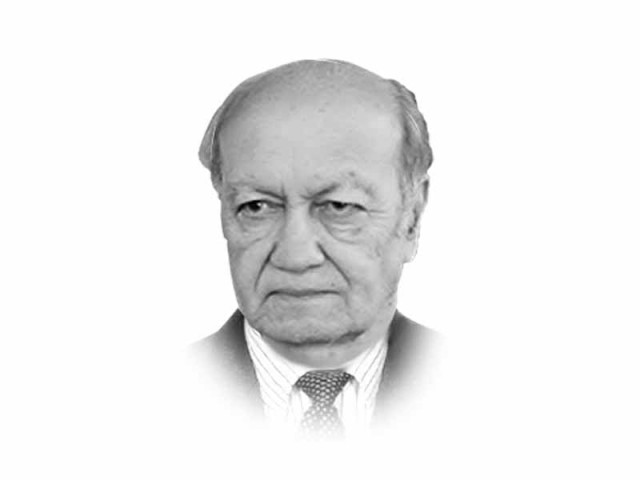Shedding the client mentality
If Pakistan has to shed the mentality of looking for patrons, it should harness the potential of its people, its land

The writer is a retired lieutenant general of the Pakistan Army and served as chairman of the Pakistan Ordnance Factories Board
In the 1950s and the 1960s when the world was deeply polarised, Pakistan aligned itself with the US and the West that was standing up to communist expansion led by the Soviet Union. Our real motive, of course, was to strengthen our defence against India for which we needed economic and military assistance. But as there is no free lunch, this turned into a client-master relationship, notwithstanding General Ayub Khan’s hollow assertion that we were “friends not masters”. The same pattern of behaviour was repeated in the 1980s during the Zia regime when he led us to believe that the Afghan jihad was meant to act as a bulwark against the expansionist Soviet Union. In the bargain, however, Pakistan was one of the top recipients of US military aid. More recently in 2001, Pervez Musharraf went overboard in joining President George W Bush’s ‘war on terror’ overnight. In lieu of this, Pakistan received generous military and economic assistance and the general became a celebrity. Only a year earlier, former US president Bill Clinton on an official visit to Pakistan had publicly snubbed Musharraf and had refused to shake hands with him for having overthrown a democratically-elected government. During his brief stay instead of addressing a joint press conference, President Clinton took the unusual step of addressing the Pakistani nation on television. This was just to recap the extent of humiliation that the nation suffered in the last few decades.
All this is not to question the wisdom of the decisions to align with the US, as one could argue that the alternatives we were posed with could have provided equally serious challenges. But the real motive behind these decisions remains questionable. First, it was a convenient pathway to gain legitimacy for both Zia and Musharraf. Until these events, these generals were international pariahs. Second, Pakistan became the beneficiary of an American largesse — a quest for dependence by then had become deeply ingrained in our leaders. Besides, they would use the benefits of aid to consolidate their illegitimate regimes. Third, in the unrealistic obsession to match India, our ruling elite are prepared to please some countries even at the expense of compromising on certain fundamentals of inter-state relations.
Similar trends of fawning have continued in our interactions with China. What is different is that the Chinese leadership is more discreet and sophisticated and does not like to flaunt its project assistance or display arrogance. Moreover with China, there is convergence on most major foreign and defence related issues. Chinese involvement in Pakistan is in long gestation development projects, especially in energy and infrastructural development, which includes the Gwadar port and the construction of highways that have a trickle-down affect. This, however, has not prevented our leaders from pursuing projects and policies that would benefit them at the personal level. Former president Asif Ali Zardari’s frequent visits to China, supposedly to promote economic and commercial relations, defied normal inter-state conduct and were intriguing.
The Gulf countries have been using sectarian groups to wage their proxy wars and this is the price that the country is paying for the monetary assistance that is occasionally provided by them. We are unnecessarily dragged into the unending rivalry between Saudi Arabia and Iran. A more neutral and dignified stance towards these countries would contribute towards our internal stabilisation. And this in turn will provide a more favourable environment for economic betterment and self-reliance.
With each of these countries, Pakistan should continue to strengthen its relationship. We need US support and partnership at the international and regional levels. No country expects to have a relationship with a superpower on the basis of equality but this does not mean that medium-sized countries cannot protect their basic national interests. Strong religious and cultural bonds tie Pakistan and the Gulf States. Remittances from Pakistani workers are vital for our economy.
One of the compelling factors for Pakistan’s chronic external dependence has been its inability to mobilise national resources through taxation and undertake structural reforms. When the PML-N government came into power, it made tall claims of ridding the country of foreign debt and developing a viable and self-sustaining economy. On the contrary, the debt portfolio in 2014 alone rose by $15.3 billion violating its own Fiscal Responsibility and Debt Limitation Act. If it were not for IMF assistance, Pakistan would be in dire financial straits. In any normal democratic country, the opposition would have applied political pressure and sought answers in parliament for this lapse. But for the opposition, economic sovereignty has also never been a priority. To Imran Khan’s credit, he has been the lone voice in demanding a more self-reliant economy but having abandoned parliament, his message hardly resonates.
The military and strategic community has been ever so aware of the country’s geostrategic and geopolitical importance but it is rare that these have been exploited to the country’s advantage. In fact, this has mostly worked against it by creating internal instability and foreign policy dilemmas.
If Pakistan has to shed the mentality of looking for patrons, it should harness the potential of its people and its land and even when it seeks external assistance, this should be with the aim to develop its national capacity. For this, the nation has to focus on education, economy, infrastructure and good governance.
Published in The Express Tribune, February 18th, 2015.
Like Opinion & Editorial on Facebook, follow @ETOpEd on Twitter to receive all updates on all our daily pieces.















COMMENTS
Comments are moderated and generally will be posted if they are on-topic and not abusive.
For more information, please see our Comments FAQ